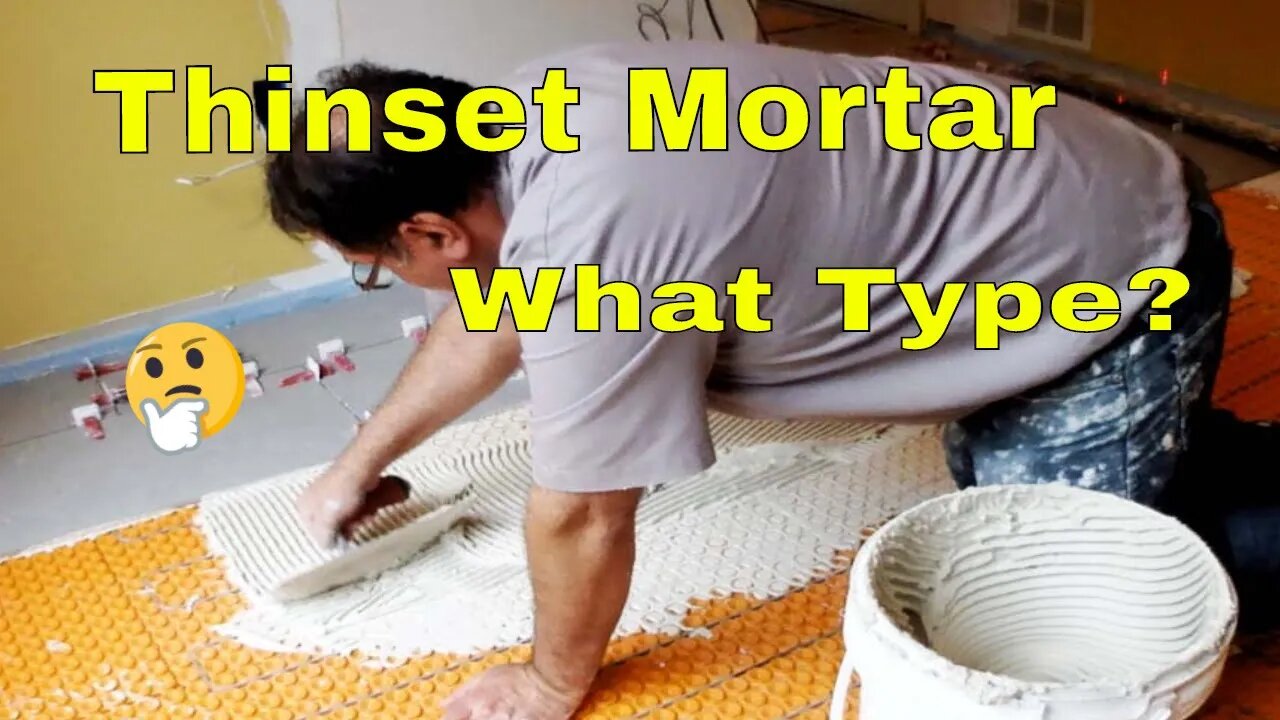Premium Only Content

Thinset explained. What you need to know
SUBSCRIBE Learn how to tile the right way
I am often asked what type of thinset should be used? So to answer this question you first need to know what kind of tile is being installed and on what kind of surface. Thinset mortar is the glue that holds the tile to your substrate, picking the right one for your tile and substrate is of critical importance. There are several material specifications for thinset mortar from the American National Standards Institute or ANSI for short. These specifications are ANSI:
A118.1 Dry Set Unmodified Mortar
A118.4 Dry Set Modified Mortar
A118.11 Dry Set Modified EGP Mortar (Exterior Grade Plywood)
A118.15 Dry Set Improved Modified Mortar
Using a thinset for a tile or substrate that it is not designed to be used for can lead to failures, so it is critical to use a mortar that is suitable for the type of tile and substrate in your tile installation. Thinset is basically a mixture of sand, and cement and other compounds to facilitate the hydration process. Thinset is the “Glue” that bonds the tile to the surface to which it is applied, and it does this by growing crystals as it dries and cures. The crystals interlock and penetrate into the surface of the tile and the substrate, bonding it all together. The longer the thinset is able to grow crystals the strong the bond and the strength of the thinset.
So what kind of thinset should be used in any given application? Well there is unmodified thinset, and modified thinset, and other kinds of thinsets, but we are just going to deal with these two types which are the most widely used. Unmodified thinset is a thinset that has no polymers added to it, a modified thinset is a thinset that has either polymers added to the powder during manufacturing, or an unmodified thinset that is mixed with a liquid polymer on the job site just before it is to be used. Modified thinset is the most widely used mortar these days and is recommended for most applications and types of tile. So why is there polymer in the thinset anyway? Well it is there to help the thinset retain moisture so it can grow those crystals we talked about earlier. Many of the substrates that tile is installed on are very porous and thirsty and will absorb the moisture present in the thinset, which in turn will prevent the thinset from gaining strength, the polymers help with this problem by keeping the moisture in the thinset so it can Hydrate (grow crystals) properly. So when you go to the store you will see that not all thinset cost the same, some are more expensive than the others, well you get what you pay for, the cheaper thinsets have less of the needed components, and the more expensive ones have more, so by extension better. Modified thinsets also add an adhesive quality to the bonding mechanism, as well as flexibility, enhancing the strength of the tile assembly. So modified thinset is used to install porcelain tiles on all kinds of substrates that call for a modified thinset.
All tile installed by Sal DiBlasi, Elite-tile Company, in the Boston North Shore area. This video contains affiliate links, which means I will receive a small commission if you click on the product link.
#tile #transformthetrade #howtotile #installingtile #howtoinstalltile #Schlutersystems
☕ Buy me a coffee ☕
https://www.buymeacoffee.com/saldibs2
🙂 This is my Amazon Store 🙂
https://www.amazon.com/shop/saldiblasi
Glass tile what you need to know https://www.youtube.com/watch?v=Q-MCdbgjSYs
💲1 PDF Floor installation guidelineshttps://sowl.co/s/wWd2d 💲1
Channel Store https://www.youtube.com/channel/UCWpu9UZ6aiRTaMuuV8-C0pQ/store
👍 Patreon https://www.patreon.com/saldiblasi 👍
YouTube Channel https://www.youtube.com/user/saldibs
Facebook
https://www.facebook.com/pages/Elite-Tile-Company/56681633342
Website
http://www.elitetileco.com/
Twitter
https://twitter.com/saldiblasi1
Instagram
https://www.instagram.com/saldiblasi1/
National Tile Contractors Association
https://tile-assn.site-ym.com/
Some of my favorite Tools
Grout Float https://amzn.to/2tdEpN2
Rubbing Stone https://amzn.to/2QrgRfh
Notched Trowel 1/4 x 1/4 x 1/4 inch https://amzn.to/36bq5mQ
Notched Trowel 1/2 x 1/2 x 1/2-Inch https://amzn.to/2Q5e90g
Notched Trowel 1/4 x 3/8 x 1/4-Inch https://amzn.to/39j1caB
Super Dust Collector – WaleTale https://amzn.to/2MDuVkK
Black Nitrile Gloves - 6 mil https://amzn.to/2SJQ6FZ
Margin Trowel https://amzn.to/352MYHx
Mortar Mixer https://amzn.to/2ZxYqtF
4in Sandpaper for Stone Polishing https://amzn.to/2ZB2skT
Polishing Rubber Backing Pad https://amzn.to/2srikdy
Montolit 63P3 24 Inch Tile Cutter https://amzn.to/2MDoFtl
DEWALT Wet Tile Saw https://amzn.to/2QqpO8O
Opt into NTCA’s VIP Text Messaging program for training opportunities.
Text “NTCA” to 31996 or Visit https://widget.smsinfo.io/v2/ae58812ba684c1dc65550d3349dbc2e6
For Industry Professionals only
-
 6:57
6:57
Rethinking the Dollar
15 hours agoCommodities Boom Incoming: Why Gold and Silver Are Leading the Charge
5652 -
 LIVE
LIVE
Sgtfinesse
1 hour agoSarge's 1st Stream on Rumble
451 watching -
 58:23
58:23
The Dan Bongino Show
4 hours agoDemocrats Enter Full Panic Mode (Ep. 2378) - 11/26/2024
474K1.14K -
 58:04
58:04
The Rubin Report
2 hours agoCNN Host Gets Visibly Angry as Her Trap for Conservative Backfires in Her Face
25.6K45 -
 1:28:35
1:28:35
Benny Johnson
2 hours ago🚨VICTORY: All Charges Against Trump DROPPED, Time For REVENGE | Mexico, Canada Bend Knee To Trump
35.1K40 -
 2:17:41
2:17:41
Steven Crowder
4 hours agoTired of Winning Yet? Jack Smith Drops Trump Charges and Mexico Bends The Knee!
293K183 -
 2:00:50
2:00:50
LFA TV
15 hours agoNATIONAL SECURITY THREAT! | LIVE FROM AMERICA 11.26.24 11am EST
23.5K17 -
 1:19:04
1:19:04
Graham Allen
5 hours agoPANIC‼️ Biden Is Giving NUKES To Ukraine! + Jack Smith DISMISSED Cases Against Trump!
101K73 -
 1:40:00
1:40:00
PMG
13 hours ago $1.00 earned"WHAT?! Trump & the Fed are DISMANTLING the Global Banking Cartel!? w/ Tom Luongo"
15.5K3 -
 2:32:28
2:32:28
Matt Kohrs
13 hours agoBitcoin Falters, Degen Psychology & Breaking News || The MK Show
50.2K4